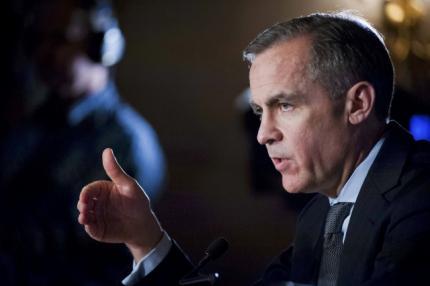Bank of England likely to hold fire, work on guidance revamp
Bareksa • 06 Feb 2014

The Governor of Britain's Bank of England, Mark Carney, speaks at an event at which he addressed business leaders and the media in Edinburgh (REUTERS/Chris Watt/Pool)
Bank of England set to announce no change to policy
Reuters - Bank of England officials are likely to use their meeting on Thursday to work out how to steer interest rate expectations now their previous plan has been overtaken by Britain's strong economic recovery.
While this week's meeting is not expected to result in any announcement, policymakers will be focussed on quarterly economic forecasts due next Wednesday, which will provide clues on how they will alter their "forward guidance" policy.
Bank policymakers have been forced to rethink their plan to link policy decisions to the unemployment rate, which has fallen far faster than they expected.
Since the bank introduced forward guidance in August, the jobless rate has plunged close to the 7.0 percent mark at which it had said it would review interest rates. The BoE originally forecast that level would not be reached until well into 2016.
With the economic recovery quickening and markets pricing in at least some chance of a rate hike late this year, BoE officials have had to stress repeatedly they have no plans to act any time soon.
Governor Mark Carney has said the Bank will start looking at how to "evolve" guidance this month, generally taken to mean when it gives its quarterly inflation report next Wednesday.
Options range from broadening the indicators used from the unemployment rate to include, say, wage growth; or copying the U.S. Federal Reserve's "dot chart" - a published matrix of each policymaker's view on future interest rates.
The BoE may not set out in detail next week how it will expand forward guidance but the inflation report might at least offer insight.
"Although the BoE shows every sign of wanting to keep interest rates low for quite a while longer, the economy is tightening faster than they had expected," said Robert Wood, chief UK economist at Berenberg.
"We expect the first rate hike in the first quarter of 2015, with a 30 percent chance of an increase in the fourth quarter of 2014. Any further guidance at the inflation report press conference next week is unlikely to risk putting the BoE too far behind the curve."
ECONOMIC REVIVAL
While emerging market troubles have sent financial markets reeling, surveys this week showed British manufacturing and services sustaining strong growth through January.
A survey from Visa Europe on Thursday showed consumer spending - including shopping, eating out and hotels - also rose solidly in January, up 1.5 percent from a year ago.
"Against a backdrop of falling joblessness and robust economic growth, consumer confidence has surged and underpinned a continued improvement in expenditure," said Paul Smith, director at data company Markit that compiled the survey.
The European Central Bank also meets on Thursday and in contrast to the BoE, there is talk of further policy loosening to combat very weak inflation - although most economists do not expect it to move this week.
While the BoE is unlikely to make a major policy announcement on Thursday, analysts are watching for confirmation that the Monetary Policy Committee will choose to reinvest the proceeds of government bonds the Bank bought through quantitative easing and which will mature before the next meeting in March.
To announce otherwise would represent an unexpected effective tightening of monetary policy.
"We do expect the MPC to use the February meeting to confirm that they will reinvest the associated cash flows back into conventional gilts with a residual maturity of at least three years," wrote Sam Hill, economist at RBC Capital Markets.
"That will result in 8.2 billion (pounds) of purchases by the Bank, which are expected to take place from the week commencing March 10."